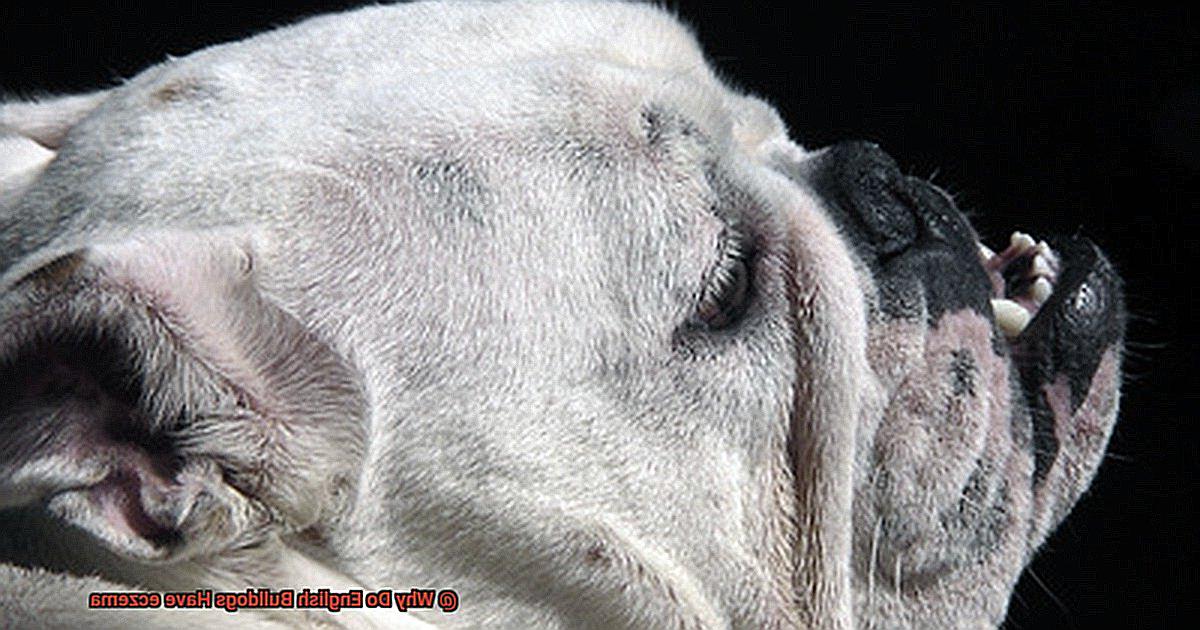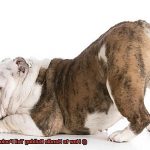Why Do English Bulldogs Have eczema?
Do you have an English Bulldog with eczema? You’re not alone. Eczema is a common skin disorder that can cause them to be itchy and painful. But why do English Bulldogs get eczema?
In this blog post, we’ll explore the causes of eczema in English Bulldogs, as well as how to spot and treat it. Plus, we’ll look at preventive steps you can take to keep your Bulldog healthy and comfortable.

Environmental factors such as allergens or irritants like certain shampoos or cleaning products may trigger an inflammatory response in the skin, which leads to eczema.
English Bulldogs are particularly prone due to their short muzzles, which make it hard for them to breathe properly, resulting in excess saliva production that can cause an allergic reaction on their skin.
Their thick fur also holds moisture against the skin, making them more vulnerable to bacterial and fungal infections that can worsen the disease.
Genetics may also play a role in why some English Bulldogs are more likely than others to experience eczema. If your Bulldog has any relatives with eczema, they may be more likely to experience it too because of shared genetic abnormalities, allergies, or asthma.
You can help your Bulldog stay healthy and happy by understanding what causes eczema in English Bulldogs and taking proactive steps towards prevention and treatment.
Causes of Eczema in English Bulldogs
Contents
- 1 Causes of Eczema in English Bulldogs
- 2 Symptoms of Eczema in English Bulldogs
- 3 Diagnosing Eczema in English Bulldogs
- 4 Treatment Options for Eczema in English Bulldogs
- 5 Diet and Nutrition for Dogs with Eczema
- 6 Grooming Tips for Dogs with Eczema
- 7 Home Remedies for Dogs with Eczema
- 8 Prevention Tips for Dogs with Eczema
- 9 Conclusion
English Bulldogs are a beloved breed, but unfortunately, they can be prone to eczema. This skin disorder can be caused by several factors, so it’s important to understand the causes in order to provide your Bulldog with the best care.
Allergens are one of the most common causes of eczema in bulldogs. Pollen, dust mites, and certain foods can all trigger an allergic reaction in Bulldogs that leads to eczema. If your Bulldog is exhibiting signs of eczema, it’s essential to identify any potential allergens and keep them away from your pup.
Genetics also play a role in eczema development in Bulldogs. They may inherit this trait from their parents or grandparents, making them more likely to develop the condition. Before bringing a new Bulldog puppy into your home, it’s vital to talk to your vet about any family history of eczema.
Hormonal imbalances can also contribute to eczema flare-ups in bulldogs. This is especially true during times of stress or when a female bulldog is in heat. Talk with your vet about how you can maintain your bulldog’s hormone balance and health.
The environment is another factor that can lead to skin irritation and cause eczema outbreaks in bulldogs. Hot and humid climates can make their skin particularly dry during these seasons, so it’s important to keep them cool and dry during these times.
Finally, parasites like fleas and ticks can irritate a bulldog’s skin, causing eczema flare-ups as well. Make sure your Bulldog is up-to-date on flea and tick prevention medications for optimal health.
Symptoms of Eczema in English Bulldogs
It’s important to be aware of the signs and symptoms of eczema. This common skin disorder can cause a variety of problems in English Bulldogs.
The hallmark signs of eczema are red, itchy patches on the skin. These patches may be dry and scaly, or moist and oozing. You may also notice bumps or blisters filled with fluid. Hair loss and discoloration of the skin are other possible symptoms.
Eczema is most likely to affect areas such as the face, ears, neck, chest, legs, and tail. Your dog may also excessively scratch or lick the affected area, which can lead to secondary infections.
If you think your English Bulldog has eczema, it’s important to seek medical attention as soon as possible.
Diagnosing Eczema in English Bulldogs
Diagnosing the condition can be tricky, but your veterinarian can help. To accurately diagnose eczema in English Bulldogs, they will perform a physical examination and laboratory testing.
During the physical examination, your vet will carefully examine your dog’s skin for signs of inflammation such as redness, swelling, and itching. They may also take a sample of the affected area to check for any underlying bacterial or fungal infections.
In addition to the physical examination, laboratory tests such as skin scrapings, biopsies, and blood tests can also be used to diagnose eczema in English Bulldogs. These tests can help identify any underlying conditions that may be causing the eczema. In some cases, allergy testing may be recommended to determine if any allergens are contributing to the condition.
If you suspect that your English Bulldog has eczema, it’s important to have them checked out by a specialist right away so they can properly diagnose and treat it.
Treatment Options for Eczema in English Bulldogs
English Bulldogs can suffer from eczema, an inflammatory skin disease. While it can be uncomfortable for your pup, the good news is that there are a variety of treatments available to help reduce symptoms and prevent future outbreaks.
Your veterinarian may prescribe topical creams and ointments, such as hydrocortisone or antifungal creams, for mild to moderate cases. Severe cases may require oral medications like antihistamines or corticosteroids.
Light therapy and phototherapy may also be recommended to reduce inflammation and itchiness associated with eczema. Diet changes are also beneficial in minimizing flare-ups by removing certain food allergens from your Bulldog’s diet.
Lastly, regular bathing with a gentle shampoo or oatmeal bath will help soothe itchy skin and keep their coat clean and healthy.
Diet and Nutrition for Dogs with Eczema
If your pup has eczema, their diet is of utmost importance. A diet rich in proteins, vitamins, and minerals can help reduce inflammation and skin irritation. Low-allergen foods should be included to reduce the risk of flare-ups. Omega-3 fatty acids are especially beneficial in treating eczema due to their anti-inflammatory properties.
Feeding your dog a balanced, nutritious diet with plenty of protein, vitamins, minerals, and omega-3 fatty acids is essential for their overall health and wellbeing. Supplements such as probiotics, fish oil, and vitamin E can also be beneficial in treating eczema. On the other hand, processed foods high in sugar or fat should be avoided, as they will worsen the symptoms.
Grooming Tips for Dogs with Eczema
Caring for a dog with eczema can be a challenge, but it doesn’t have to be. With the right grooming routine, you can help keep your pup’s skin healthy and free of irritation. Here are seven essential tips to help you groom your pup safely and effectively.
Brush Regularly
Regular brushing is key when it comes to keeping your pup’s coat clean and free of allergens that may exacerbate their eczema. Use a soft brush or comb to gently remove loose hair and debris from their coat.
Bathe Gently
When bathing your pup, use a mild shampoo specifically designed for dogs with sensitive skin. Avoid bathing them too frequently, as this can dry out their skin and make the condition worse. After bathing, use a moisturizing conditioner to help lock in moisture and protect their skin from further irritation.
Trim Nails Carefully
Trimming long nails is very important, as it helps reduce the risk of scratching or irritating the skin further. Be sure to use nail trimmers that are specifically for dogs, as human clippers are too sharp and can cause injury to your pup’s delicate paws.
Choose the Right Products
When brushing your dog’s coat, use a clean brush or avoid products with strong chemicals or fragrances, as these can exacerbate eczema’s symptoms. Look for shampoos and conditioners that have been specifically developed for sensitive skin, as these will be gentler on your pup’s delicate coat.
Keep Hair Short
If possible, keep your pup’s hair short, as this will help minimize itching caused by eczema flare-ups. Longer coats tend to trap dirt and grime, which can irritate the skin further, so keeping your dog’s fur trim is a vital part of their health.
Try Natural Remedies
There are several natural products that can be used to treat irritated skin caused by eczema flare-ups, such as aloe vera gel or coconut oil applied directly onto the affected area. For best results, consult with your doctor about using natural remedies alongside traditional therapies.
Check Skin Daily
It’s also important to check your pup’s skin for signs of irritation or inflammation caused by eczema flare-ups on a daily basis. If you find any redness or swelling on their body, it’s best to go straight to the hospital for treatment.
Home Remedies for Dogs with Eczema
Are you concerned about your pup’s eczema? There are a few home remedies that may be able to help! Omega-3 fatty acids are an essential part of keeping skin healthy and reducing inflammation associated with eczema. Aloe vera is a natural moisturizer and can be applied topically to the affected areas of the skin.
In addition, it’s important to avoid irritants that may be causing the eczema in the first place. This includes certain shampoos, soaps, detergents, and other chemicals. Regularly bathing your dog with a mild shampoo specifically designed for dogs with sensitive skin can help keep their skin clean and free of allergens that may trigger an eczema flare-up.
Lastly, keeping your dog’s environment clean and free of dust mites or other allergens can also help reduce the risk of an eczema flare-up.
Prevention Tips for Dogs with Eczema
If your English Bulldog is suffering from eczema, it is essential to take preventive measures to reduce the risk of flare-ups and keep their skin healthy. Here are nine tips that can help you do just that.
Moisturize Regularly
Keeping your Bulldog’s skin moisturized is key to preventing eczema flare-ups. Use a hypoallergenic lotion or cream specifically designed for dogs with sensitive skin, and avoid soaps and shampoos that contain harsh chemicals, as they may irritate the skin and worsen symptoms.
Brush Regularly
Brushing your Bulldog regularly will remove dead skin cells and reduce shedding, which can trigger allergies in some dogs. In addition, brushing helps spread natural oils throughout their coat, keeping their skin looking healthy.
Bathe Carefully
Bathe your bulldog no more than once a week with a mild, hypoallergenic shampoo specifically designed for dogs with sensitive skin. Make sure to dry them thoroughly after bathing, as moisture can exacerbate eczema symptoms in some dogs.
Clean Home Environment
To minimize the risk of eczema flare-ups, keep your Bulldog’s living area clean and free of dust mites, mold, pollen, and other allergens. Change bedding regularly and vacuum regularly to reduce the presence of allergens in the home environment.
Provide Supplements
Omega-3 fatty acids, probiotics, and vitamins C and E have been known to help reduce inflammation associated with eczema in some dogs. Before giving any medications, please consult your veterinarian to ensure they are safe for your dog.
Feed a Healthy Diet
A healthy diet is essential for keeping your Bulldog’s skin healthy and free from irritation. Try to feed them a balanced diet with plenty of fresh fruits and vegetables as well as lean proteins like fish or chicken.
Use Natural Remedies
There are several natural remedies that can be used to help soothe itchy skin and reduce inflammation associated with eczema, such as aloe vera gel or coconut oil.
Reduce Stress Levels
Stress can cause flare-ups in some dogs, so try to keep your Bulldog’s environment calm and relaxed as much as possible by providing plenty of exercise and mental stimulation throughout the day.
Also Read: Why Do English Bulldogs Have Bald Spots on Back?
Conclusion
English Bulldogs are a beloved breed, but unfortunately they can be prone to eczema. Allergens, genetics, hormones, and parasites can all cause this skin disorder. Symptoms such as redness, itching, bumps or blisters of fluid, and hair loss are all typical signs of eczema in Bulldogs.
If you suspect your pup has eczema, it’s important to seek medical attention immediately.
Fortunately, there are several treatments available for dogs with eczema, including topical creams and ointments, oral medications, light therapy, and phototherapy. Diet changes can also help reduce flare-ups by excluding certain food allergens from your dog’s diet.
Plus, there are several home remedies that may help reduce inflammation and irritation associated with eczema, such as omega-3 fatty acids and aloe vera gel.
To prevent future outbreaks of eczema in your English Bulldog, it’s important to keep their coat clean and free of allergens by brushing regularly and bathing with a mild shampoo specifically designed for dogs with sensitive skin.
In addition, they need a balanced diet high in proteins, vitamins, and omega-3 fatty acids to maintain their overall health and wellbeing.
Lastly, reducing stress levels can also reduce the chance of flare-ups, so try to keep your Bulldog’s environment as calm and relaxed as possible throughout the day.




